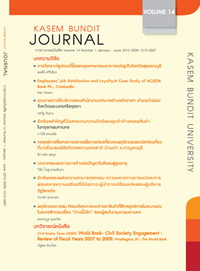อิทธิพลของพลังความสามารถแห่งตน ความฉลาดทางอารมณ์และการผ่อนคลายความเครียดที่มีต่อภาวะผู้นำการเปลี่ยนแปลงของผู้บริหารรัฐวิสาหกิจ
Keywords:
พลังความสามารถแห่งตนของผู้นำ, ความฉลาดทางอารมณ์, การผ่อนคลายความเครียด, ภาวะผู้นำการเปลี่ยนแปลง, Leader self-efficacy, Emotional intelligence, Sense of humor, Transformational leadershipAbstract
ผู้นำเป็นบุคคลที่มีพลังในการขับเคลื่อนบุคลากร เพื่อให้ได้รับสิ่งที่ต้องการตามเป้าหมาย บุคคลที่มีภาวะผู้นำเป็นที่ต้องการขององค์การทุกองค์การ เพราะองค์การสามารถผูกความสำเร็จขององค์การกับความสำเร็จของผู้นำได้โดยง่าย ผู้บริหารเป็นตัวจักรสำคัญในการขับเคลื่อนองค์การ ดังนั้นบุคลากรที่ก้าวขึ้นมาเป็นผู้บริหารจำเป็นต้องมีความเป็นผู้นำโดยเฉพาะภาวะผู้นำแห่งการเปลี่ยนแปลง เพื่อตอบสนองต่อสภาพแวดล้อมและสถานการณ์ที่เปลี่ยนแปลงไปอย่างรวดเร็วได้อย่างมีประสิทธิผล
ประชากรของการวิจัยนี้ เป็นผู้บริหารรัฐวิสาหกิจ 2,948 คน การวิจัยเชิงปริมาณโดยการสำรวจจากตัวอย่าง และการวิจัยเชิงคุณภาพโดยการสัมภาษณ์เชิงลึก ตัวอย่างการวิจัย จำนวน 385คนจากแบบสอบถามที่ส่งไปยังหน่วยงานต่างๆ ของรัฐวิสาหกิจ แล้วเลือกเฉพาะแบบสอบถามที่ตอบคำถามสมบูรณ์ เป็นผู้บริหารบริษัท ปตท. จำกัด (มหาชน) จำนวน 117 คน, การไฟฟ้านครหลวง จำนวน 153 คน และการประปานครหลวง จำนวน 115 คน เก็บข้อมูลระหว่างเดือนพฤษภาคม ถึงเดือนกันยายน ปี 2555
ผลการวิจัยพบว่าพลังความสามารถแห่งตนของผู้นำ ความฉลาดทางอารมณ์และการผ่อนคลายความเครียดมีส่วนส่งเสริมภาวะผู้นำการเปลี่ยนแปลงของผู้บริหาร ภาวะผู้นำการเปลี่ยนแปลง ประกอบด้วย 5 ส่วนหลัก ได้แก่ การมีอิทธิพลที่เป็นแบบอย่างที่ดีต่อผู้ตาม ทั้งด้านคุณลักษณะและการประพฤติ การจูงใจด้วยการสร้างแรงบันดาลใจ การกระตุ้นทางสติปัญญาและการพิจารณาเป็นรายบุคคล
พลังความสามารถแห่งตนของผู้นำมีผลต่อภาวะผู้นำการเปลี่ยนแปลงของผู้บริหารรัฐวิสาหกิจมากที่สุด ที่ค่าสัมประสิทธิ์ของการกำหนด (R2change) = .470 ความฉลาดทางอารมณ์และการผ่อนคลายความเครียดมีอิทธิพลรองลงมาตามลำดับ (R2change = .453 และ .160) ผู้บริหารโดยภาพรวมส่วนใหญ่มีพลังความสามารถในการนำ มีความใส่ใจทางสังคม และมีทัศนคติที่ดีต่อการผ่อนคลายความเครียดระดับสูง ซึ่งเป็นผลดีต่อการประสานการทำงานให้เกิดความราบรื่น
Leaders are persons who have power to drive manpower to achieve organization goals. A person who has leadership is required by all organizations because the success of organization can be bound with the success of leader easily. Executives are driving forces of organizations so that a person who is expected to be an executive needs to have leadership, especially transformational leadership to response to rapid changes in environment and situations effectively.
The populations of this research were 2,948 executives of state enterprises. The quantitative approach was based on a sample survey of 385 executives whereas the qualitative approach was based on in-depth interviews of purposively selected executives. They were the executives of PTT (Public) Co., Ltd. (117 persons), Metropolitan Electricity Authority (153 persons), and Metropolitan Waterworks Authority (115 persons). Data collection was conducted during May to September 2012.
It was revealed that Leader self-efficacy, emotional intelligence and sense of humor enhanced transformational leadership of executives. Transformational leadership was composed of idealized influence (attributes & behavior), inspiration, motivation, intellectual stimulation and individualized consideration. Among leader self-efficacy, emotional intelligence and sense of humor, leader self-efficacy influenced transformational leadership most (R2change = .470), emotional intelligence and sense of humor being second and third in importance respectively (R2change = .453 and .160). Most executives appeared to have high leader self - efficacy, social awareness and sense of humor all of which could lead to smooth co-ordination in management.
Downloads
How to Cite
Issue
Section
License
ทัศนคติ ความคิดเห็นใด ๆ ที่ปรากฏในวารสารเกษมบัณฑิตฉบับนี้เป็นของผู้เขียน โดยเฉพาะ มหาวิทยาลัยเกษมบัณฑิตและบรรณาธิการ ไม่จำเป็นต้องมีความเห็นพ้องด้วย







